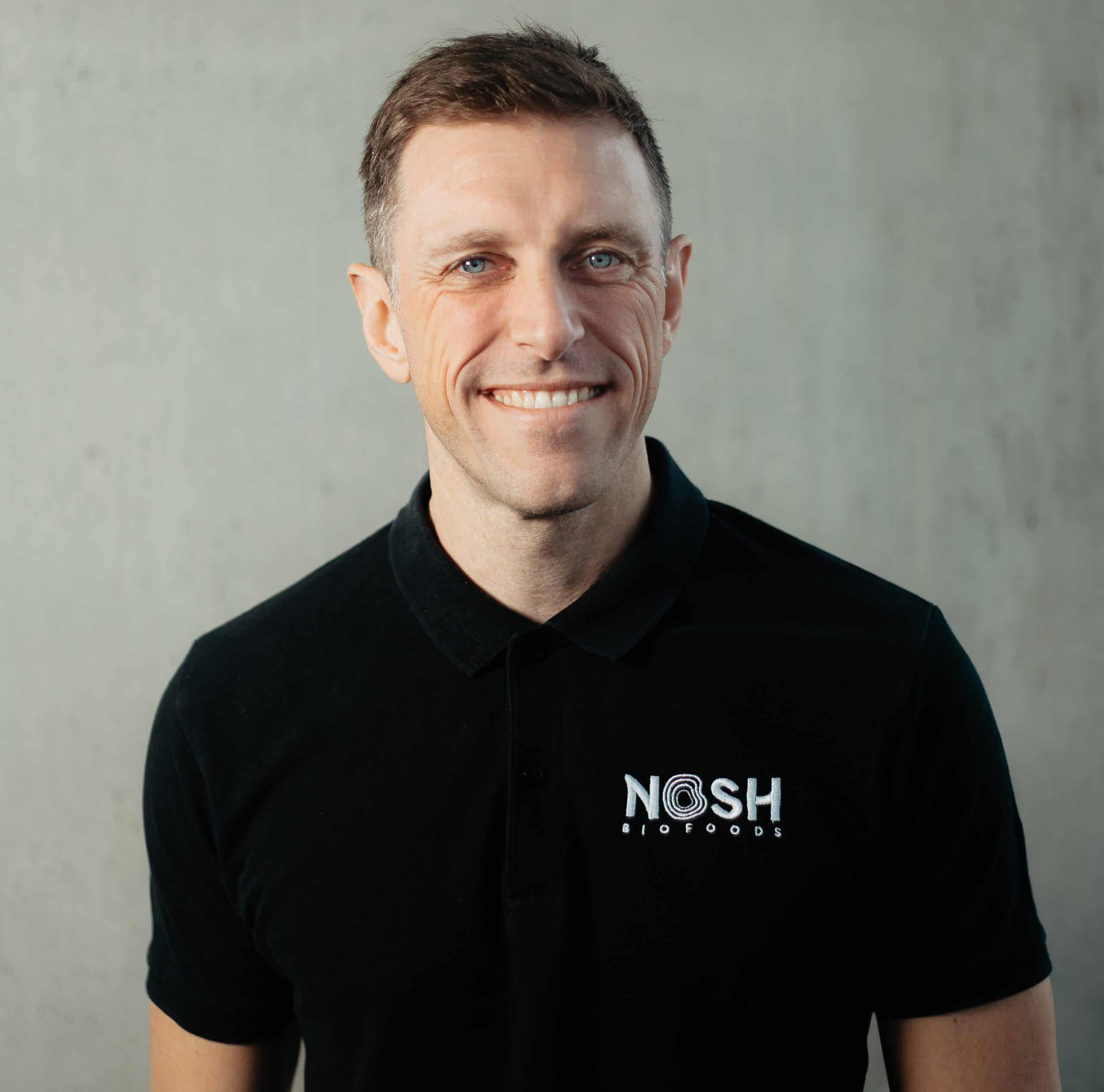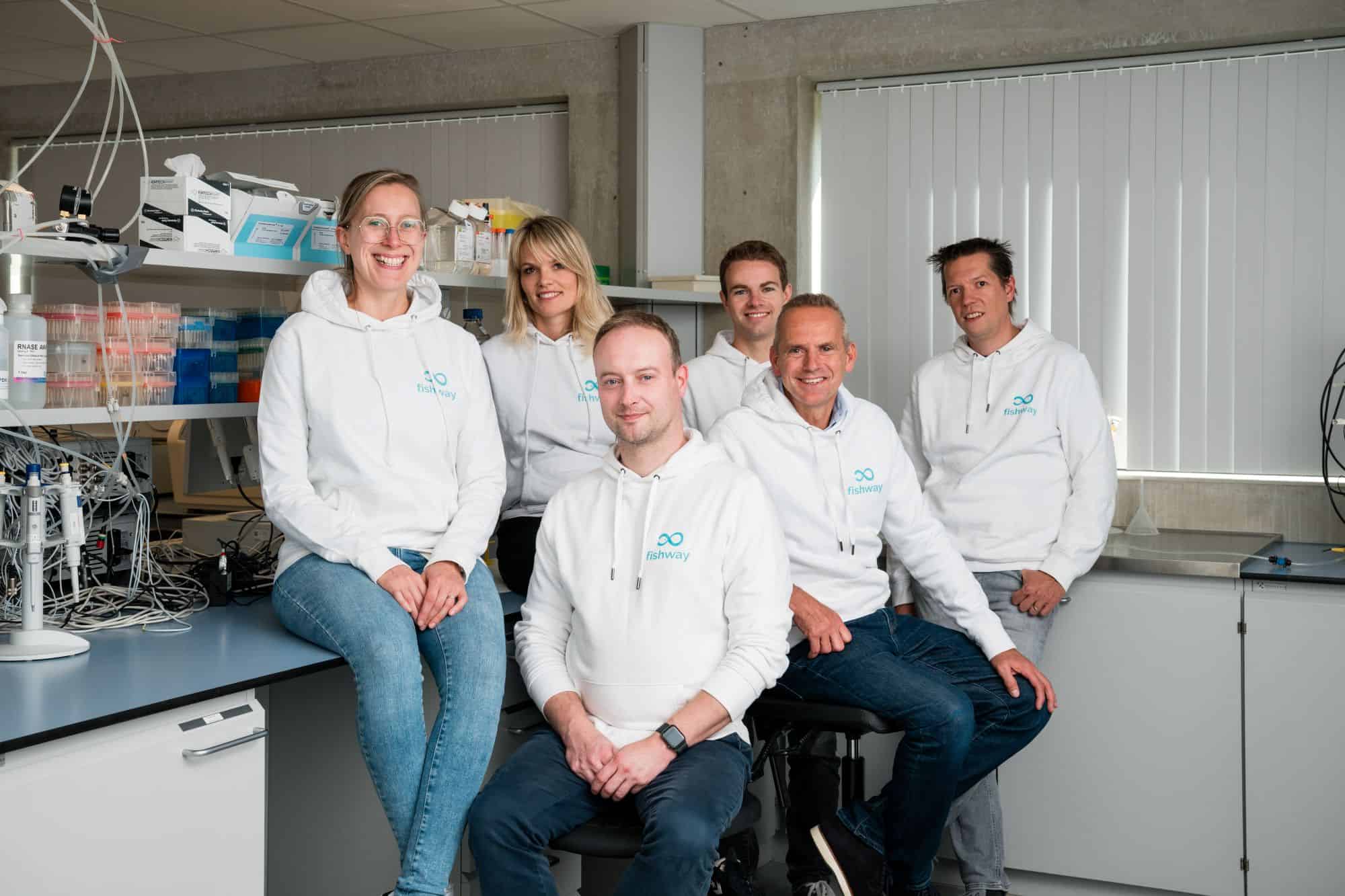Nosh.bio is a Berlin-based startup focused on developing sustainable, scalable protein solutions using koji-based fermentation. Founded in 2022, the company aims to help food manufacturers create affordable, nutritious, and environmentally friendly ingredients for plant-based and hybrid food products.
Tim Fronzek, Co-Founder and CEO, has over 15 years of leadership experience. Prior to Nosh.bio, Tim co-founded reBuy.com, growing it to €200 million in net sales. After taking a break in 2020 to reflect on his next venture, Tim co-founded Nosh.bio with microbiologist Felipe Lino to drive positive environmental change through innovative food solutions. Under Tim’s leadership, Nosh.bio partners with food manufacturers to overcome the taste, texture, and price challenges, especially in hybrid and plant-based applications. With a focus on industrial readiness and cost-effective scale-up, the team is helping accelerate the shift toward more sustainable, consumer-ready products.
In this interview, Tim Fronzek discusses Nosh.bio’s journey, the advantages of koji protein, and the company’s vision for sustainable food production.
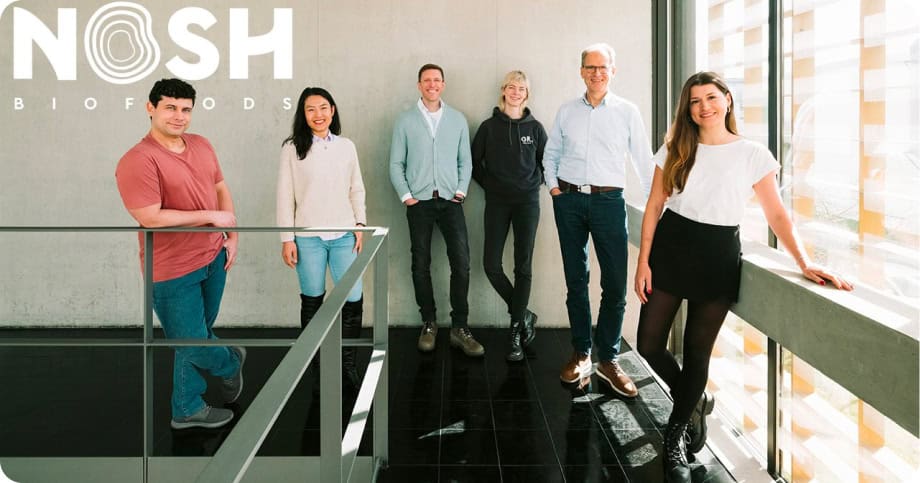
Can you walk us through Nosh.bio’s journey and the inspiration behind developing koji-based protein as an alternative to animal-derived proteins?
Nosh.bio’s journey began in 2021, when Dr. Felipe Lino, a microbiologist and I met in the Berlin office of company builder EVIG. We quickly discovered a shared commitment to climate protection and a strong alignment of ethical values. Over the following months, we immersed ourselves in the alternative protein sector, uncovering the significant impact the food industry has on global greenhouse gas emissions, with livestock agriculture as a major contributor.
At the same time, French business strategist Alix Chausson, working at EVIG to launch pioneering bio and foodtech startups, was helping shape the early direction of the idea that would become Nosh.bio. Her expertise in commercial strategy and market positioning proved instrumental in translating science into a scalable business.
Founded with a clear purpose rather than just a product: to help build a more self-sustaining food system by making sustainable food affordable, nutritious, delicious, and accessible to all. From the outset, this vision has been unwavering – a future where food no longer harms the planet, animals, or people.
In February 2022, Nosh.bio was formally established in Berlin.
Nearly three years on from that first meeting, Nosh.bio is closer than ever to bringing its koji-based protein products to supermarket shelves across Europe and to making it available to all.
How does koji-based protein compare to other fermentation-derived proteins in terms of scalability and versatility?
We focus and differentiate ourselves from competitors through three core pillars:
1. Scale Fast, Spend Less
Market-ready non-GMO, non-novel, and GRAS-certified solutions are rapidly scalable via retrofitted breweries. Low CAPEX (Capital Expenditure) and OPEX (Operational Expenditure)model, using affordable inputs and minimal downstream processing.
2. Local Production, Global Impact
Our proprietary biomass fermentation uses agricultural side-streams to produce protein with minimal CO₂ emissions and resource use. Robust fungi thrive on low-value substrates, like spent grains from breweries, enabling a decentralized production in breweries,reducing supply chain risks and ensuring local, climate-resilient output.
3. One Protein, Endless Possibilities
Koji-protein is completely customisable and available in multiple formats, with neutral colour, taste and texture for use across meat, seafood, convenience, confectionery, dairy, bakery and health & well-being products. It can be used in analogues, hybrid products, or to provide functional upgrades, delivering versatility across categories. Made from nutrient-rich, allergen-free, non-GMO fungi, it supports short, clean-label formulations that meet modern consumer demands for simple and wholesome ingredient lists.
From a technological perspective, our platform combines the strengths of biomass and precision fermentation with the scalability of cellular agriculture and the sensory advantages of plant-based alternatives. We deliver safe, versatile, non-GMO proteins at high yields using cost-effective feedstocks and streamlined, low-CAPEX processes, producing a neutral, adaptable ingredient ready for industrial-scale production without reliance on traditional agriculture.
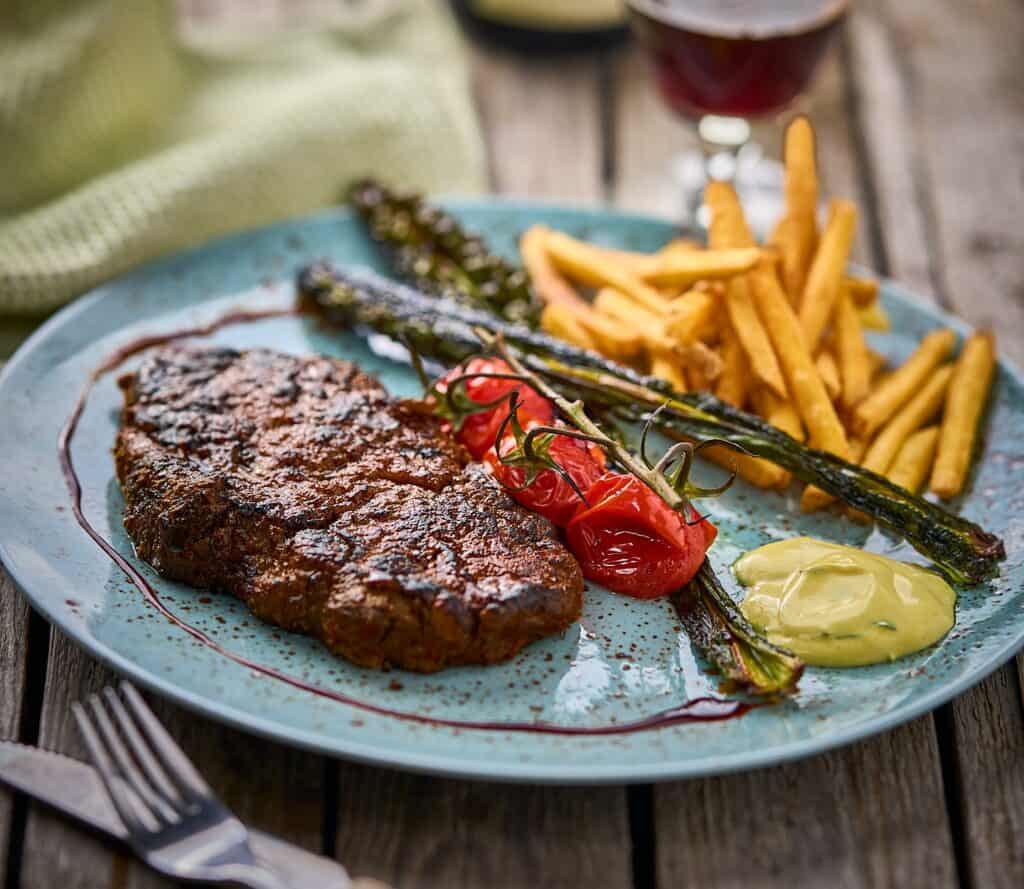
Can you explain your collaboration with Zur Mühlen Group and how it supports Nosh.bio’s market strategy?
We operate a B2B model, partnering with food manufacturers and ingredient suppliers to co-develop products and tap into their established distribution networks. Our first commercial partner in Germany, Zur Mühlen Group, is a leader in its field, and together we are working on multiple product applications.
The extensive retail reach of our partners aligns perfectly with our mission to create meaningful impact – enabling us to bring affordable, nutritious and delicious ingredients to consumers at scale, while leveraging their already established network and exposure.
How does using existing fermentation facilities, like the brewery near Dresden, contribute to your cost-effective production model?
Our proprietary technology allows us to retrofit existing food-grade manufacturing facilities, like brewery tanks in Großröhrsdorf, instead of building new plants from the ground up. This approach lets us scale production up to six times faster while cutting capital expenditures by more than 80%.
Additionally, by avoiding heavy upfront investments and minimizing depreciation, we gain a significant cost advantage on both CAPEX and OPEX, resulting in far more competitive unit economics.
Lastly, it aligns nicely with our sustainability goals as we give these huge steel tanks a second purpose.
How does Nosh.bio’s fermentation process help reduce environmental impact compared to animal farming and plant-based proteins?
At Nosh.bio, we’ve intentionally chosen fermentation as our core technology because it enables us to produce sustainable proteins and ingredients using only a fraction of the resources required for animal-based and even many plant-based alternatives.
Our circular process uses agricultural side-streams and retrofitted breweries to enable decentralized, low-footprint production, with the long-term goal of achieving carbon negativity and freeing land for reforestation.
The environmental payoff is game-changing:
- Versus beef: 98% less water use, 90% fewer CO₂ emissions (with renewable energy), and 99% less land use.
- Versus plant-based proteins: 96% less water use and 88% less land use.
By eliminating reliance on arable land and fossil fuels, and designing a circular model that transforms waste streams into value while scaling through existing fermentation infrastructure worldwide, we reduce environmental pressure and enable truly sustainable protein production.

What challenges have you faced in scaling production, and how have you addressed them?
Filamentous fungi are well known for naturally providing meat-like textures. The initial challenge was selecting a strain that balanced nutrition, safety, straightforward regulatory status, robustness, functionality and taste.
After choosing our champion strain, we quickly transitioned to scale-up mode by collaborating directly with equipment providers and potential CMOs. One of the biggest challenges in scaling up fermentation is moving from lab results to full-scale production. There’s no shortcut – computer simulations can’t replace real-world testing. It requires step-by-step trials with increasing volumes, with various hurdles along the way, like oxygen issues or contamination, to name a few. It’s often a trial-and-error process, which takes time, energy, and careful attention to detail.
How do you see consumer preferences evolving in terms of taste, texture, and nutrition for alt-proteins?
Taste Comes First
No matter the price point, consumers will not compromise on flavor. Taste remains with price one of the single most important purchase drivers. Delivering a consistently delicious product is essential, both to win first-time buyers and to retain them. This means ensuring flavor and texture are identical across batches, building trust as we scale.
Texture & Nutrition as Key Differentiators
Beyond taste, texture is a powerful differentiator. The right bite, juiciness, and mouthfeel can make or break consumer adoption. At the same time, nutrition is gaining weight in purchase decisions. More consumers are seeking whole-food, minimally processed options with a clear nutritional benefit, in part as a response to the backlash against ultra-processed foods.
Price as the Next Deciding Factor
Right after taste, affordability is critical to securing shelf space and attracting consumers. Early purchases of new meat alternatives are often driven by price and curiosity. And here the price comparison needs to be with animal meat and not only with other alternative products.
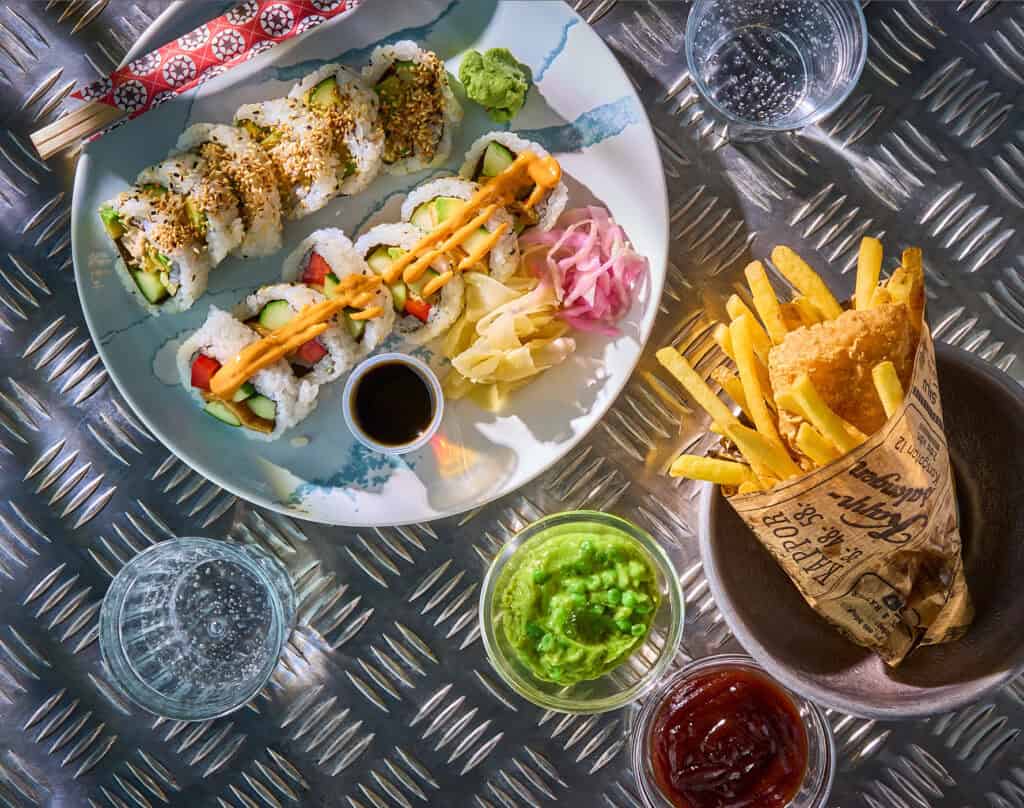
What can we expect from Nosh.bio in the coming months?
In the upcoming months we will focus on three key elements:
1. Rolling out new products – Bringing products developed with our partners to supermarket shelves in Europe.
2. Scale-up & Operations – Although we’ve reached cost parity with meat, we will further optimize costs through improved efficiency and scaling production.
3. Education – We will actively broaden the knowledge on Koji protein with both B2B clients and end consumer,s highlighting how it’s made and why it matters.
By launching new products, scaling production, and raising awareness of Koji protein, we’re enabling wider access to nutritious, sustainable alternatives that can help reduce the environmental impact of meat consumption and production
What do you see as the next big breakthrough in alt-proteins, and how is Nosh.bio positioned to lead this innovation?
The next major leap for alt-proteins will come from focusing on the essentials: delivering products that are affordable, nutritious, and delicious—the three non-negotiables for successful market adoption.
One promising avenue is hybrid products, blends of meat and alternative proteins that resonate with flexitarians and omnivores. Studies show they can match or exceed conventional meat in taste and texture. In Europe, nine major supermarket chains have pledged to reach a 50:50 plant–animal protein ratio by 2030. After a slower uptake of 100% plant-based products, blended formats offer a realistic path to these targets.
This is where Nosh.bio comes in: our mycelium-based Koji Protein is a true plug-in solution, seamlessly integrating into existing meat production lines without costly changes, delivering exceptional texture, nutrition, and clean labeling. We actively help partners stay competitive, meet shifting consumer demand, and move toward a more sustainable future.

